Should Christians TITHE?
Did Abel, Noah and Lot all tithe? Didn't Abraham and Jacob give a TENTH to God (Gen.14:12; Gen.28)? Did Paul say that preachers should EARN their living BY their preaching (1 Cor. 9:11-14)? Didn't Christ command us to "not leave (TITHING) ...undone" (Mt.23:23)? If we don't tithe, aren't we STEALING from God (Mal.3:8)? Will THIEVES inherit eternal life (1 Cor. 6:10)? Aren't the wages of sin death (Rom. 6:23)? How many TITHES are there? Who was Melchizedek (Gen.14:12)? Is the "law no more" (Lam. 2:9)?
God Owns Everything
God says, "the LAND is mine; for ye are strangers and sojourners (tenants) with me" (Lev. 25:23). "The SILVER is mine, and the GOLD is mine, saith the Lord of hosts" (Hag. 2:7). "ALL LIVES are mine" (Ez. 18:4). "The EARTH is the Lord's, and the fulness thereof; the WORLD, and THEY WHO DWELL THEREIN" (Ps. 24:1). God is "possessor of HEAVEN and EARTH" (Gen. 14:19). Both RICHES and HONOR come of thee ... and in thine hand is POWER and MIGHT" (1 Chr. 29:12). "Who hath given to me, that I should repay him? Whatever is under the whole heaven is mine" (Job 41:11). “For EVERY BEAST of the forest is Mine, And the CATTLE on a thousand hills. “I know EVERY BIRD of the mountains, And EVERYTHING THAT MOVES in the field is Mine. “If I were hungry, I would not tell you, For the WORLD and ALL IT CONTAINS are Mine." (Psalm 50:1-0-12). Therefore, TITHING must represent a TAX we pay to God for the USE or RENT of His world; and for the very BREATH we breathe (Dan. 5:23). If we don't TITHE, we are STEALING from our Father and our Landlord (Mal. 3:8).Tithing Existed Long Before The Old Covenant
If tithing CAME INTO BEING as a result of the Old Covenant (Ex.19:5 to 24:8), then it would become DEFUNCT if the Old Covenant was ABOLISHED. But that covenant CAN'T TAKE AWAY what it DIDN'T BRING IN. Tithing existed prior to the Old Covenant as well as within it (Deut.26:12-13).
However, the washings, temple, incense, burnt offerings, sacrifices, "ministration of death" and even the Levitical priesthood were all "ADDED BECAUSE OF TRANSGRESSIONS" (Gal.3:19) to an already existing Old Covenant (Ex.19:5 to 24:8). They were either non-existent or not commanded prior to that time (cp. Jer.7:22; Heb.7; 9:10).
Only those laws which existed prior to, and within, the original Old Covenant are permanent laws since God's character doesn't change (Mal.3:6) and Jesus Christ is "the same yesterday and today and forever" (Heb.13:8). He wouldn't change standards; if a law is eternal, it is moral.
Tithing was in existence from the very beginning because Christ called Abel "RIGHTEOUS" (Matt.23:35) and we know that "ALL THY COMMANDMENTS (Heb. "mitsvah") are RIGHTEOUSNESS," and tithing is one of those COMMANDMENTS (Heb. "mitsvah) (Lev.27:34;
Deut.26:12-13). Perhaps Abel was tithing in Genesis four.
Using this same reasoning, we know that both Noah and Lot must have tithed, for Noah is called "A PREACHER OF RIGHTEOUSNESS" (2 Pet.2:5) and Lot is called a "RIGHTEOUS MAN" (2 Pet.2:8). Noah "walked with God" (Gen.6:9) and two can't walk together unless they agree.
In fact, secular historical records show that the custom of tithing "was ALMOST UNIVERSAL IN ANTIQUITY; for GREECE and ROME see Pauly-Wissowa, Realencyclopadie, iv. 2306, 2423; for BABYLON, M. Jastrow, Religion of Babylonia and Assyria, p.668; for CHINA, J. Legge, Chinese Classics, i. 119; for EGYPT, G. Maspero, Struggle of Nations, p.312. For OTHER INSTANCES see Spencer, De legibus hebraeorum, lib. iii. cap. 10:1." (Encyclopedia Britannica, 11th ed., vol.26, p.1019).
For tithing to have received such wide-spread acceptance around the world, it must have been taught and practiced by Noah before his family spread around the world. Yes, "It has been all but demonstrated that TITHES WERE PAID in Babylonia BEFORE ABRAM WAS BORN, so that for the origin of the practice we are sent further back, seemingly, than 2000 B.C." (p.22, The Tithe In Scripture, by Henry Lansdell). God gave mankind TITHING as an ANTIDOTE against COVETOUSNESS! TITHING is the SOLUTION to OBEYING the TENTH commandment and avoiding selfishness and greed!
In Genesis 14:19-20, Melchizedek, king of Salem and priest of the most high God, said, "Blessed be Abram ... And blessed be the most high God, who hath delivered thine enemies into thy hand. And he (Abram) gave him (Melchizedek) tithes of all" (the "prey" -- Ant.1:10:2).
These spoils of war that Abram tithed on were "all the goods of Sodom and Gomorrah, and all their victuals" as well as whatever supplies and weapons Chedorlaomer and the armies that were with him had brought. In other words, tithing doesn't only apply to "thy corn," "thy wine," and "thine oil." Any profit or gain is tithable.
All Christians are "children of Abraham" (Gal.3:7,29; Rom.4:11). Since Abraham tithed (Gen.14:20), and Christ said, "If ye were Abraham's children, ye would do the works of Abraham" (John 8:39), why don't Christians tithe too?
Genesis 14:19-20 is the first time tithing is actually mentioned in the Bible. In Genesis 26:5, the Eternal said, "Abraham obeyed my voice, and kept my charge, my commandments, my STATUTES (Heb. "chuqqah"), and my laws." One of those STATUTES is later mentioned in Numbers 18:23-24 which says, "it shall be a STATUTE (Heb. "chuqqah") forever throughout your generations, that among the children of Israel they (the Levites) have no inheritance. But the TITHES of the children of Israel ... I have given to the Levites to inherit."
Now all Christians, no matter what race they belong to, are spiritual Israelites (Gal.6:16; Rom.11; Eph.2:11-19; Rom.2:29). Since physical Israelites tithed (Lev.27:30-34; Num.18:23-24), why don't Christians tithe too?
Since God doesn't change (Mal.3:6) and Jesus Christ is "the same yesterday, and today, and forever" (Heb.13:8), it is safe to say that TITHING TO A PRIESTHOOD was just as much a STATUTE in Abraham's day as it was in the days of the Levites. The only difference is that Abraham tithed to the Melchizedek rather than Levite Priesthood.
"All scripture is given by inspiration of God, and is profitable for doctrine, for reproof, for correction, for instruction in righteousness" (2 Tim.3:16) and the only "scriptures" known to Timothy were the Old Testament. And "whatever things were written aforetime (in the Old Testament) were written for our learning" (Rom.15:4). "Now these things (we read about in the Old Testament) were our examples" and "they are written for our admonition, upon whom the ends of the world are come" (1 Cor.10:6,11).
In addition to Abraham, we find another example for our learning. Genesis 28:20 says, "Jacob vowed a vow, saying, If God will be with me, and will keep me in this way that I go, and will give me bread to eat, and raiment to put on, So that I come again to my father's house in peace; then shall the Eternal be my God ... and OF ALL that thou shalt GIVE me I will surely GIVE the TENTH unto thee." Jacob was promising to tithe on everything he would get, not just "PRODUCTIVE INCREASE" or wages, but GIFTS also.
Incidentally, the Pharisees in Christ's day felt the same way. They were experts at TITHING (Matt.23:23) and took pride in GIVING TITHES of ALL that they POSSESSED (Luke 18:12). Furthermore, Numbers 18:30, Deuteronomy 14:22,28 and 26:12, and 2 Chronicles 31:5 all mention "INCREASE" as the quantity from which TITHES are to be taken. That includes GIFTS as well as wages.
Isaac must have also TITHED since Abraham would have COMMANDED "his children and his household after him, that they shall KEEP the WAY of the ETERNAL, to do JUSTICE and JUDGMENT" (Gen.18:19).
Now if Abel, Noah, Lot, Abraham, Isaac and Jacob all tithed, long before the Old Covenant existed, then what the Old Covenant didn't bring in, it can't take away when it is abolished.


Tithing And "The Book Of The Law"
God promised to keep his covenant (the book of Deuteronomy) with his people for a thousand generations (Deut.7:9; Ps.105:8; 1 Chr.16:15) and the Bible defines a "generation" as a "hundred" years (Gen.15:13-16). Therefore, since 3500 years divided by 100 equals 35, from Moses day to our day is only 35 generations. Both the covenant and the law are still in full force! Since TITHING is part of that covenant (Deut.14:22,28 & 26:12), it couldn't be abolished.
Moses "who received the lively oracles (including TITHING) to give unto us" (who are Christians) (Acts 7:37-38), would not have given them to us if they were abolished. As Christ said, "Do not think that I will accuse you to the Father: there is one that accuses you (of sin), even Moses, in whom ye trust. For had ye believed Moses, ye would have believed me: for he wrote of me. But if ye believe not his writings, how shall ye believe my words? (John 5:45-47). Moses wrote the first five books of the Bible.
TITHING is not found in the "BOOK OF THE COVENANT" (Ex.19:5 to 24:8). But if only those laws found there are eternal, moral laws, then what good is the rest of the Bible? TITHING is not the only law left out of this abbreviated section of scripture. Clean-unclean meats, Feast of Trumpets and Day of Atonement are other notable omissions.
Just as the life of Christ is detailed in four separate books (Matthew, Mark, Luke & John), and just as the history of Israel is written in parallel accounts (1 & 2 Samuel, 1 & 2 Kings, and 1 & 2 Chronicles), so the "BOOK OF THE COVENANT" (Ex.24:7) from Exodus 19:5 to 24:8 is also found from Deuteronomy 1 to 34 in "THE BOOK OF THE LAW" (Deut.31:24,26). It is no accident that the word "Deuteronomy" means "The Second Law." "THE BOOK OF THE COVENANT" (Old Covenant) is synonymous with "THE BOOK OF THE LAW" in the same sense that the four gospels are synonymous. Proof is found by comparing 2 Kings 22:8 and 23:2 where the two phrases are used INTERCHANGEABLY. They are two complementary parts of the same book.
That being understood, we find that the book of Deuteronomy DOES contain the law of TITHING. But before going there, we should examine a few other scriptures relating to TITHING. Leviticus 27:30-33 says:
And all the tithe of the land, whether of the seed of the land, or of the fruit of the tree, is the Eternal's (Not the churches' or ministers'): it is holy unto the Eternal. And if a man will at all redeem (buy back) ought of his tithes, he shall add thereto the fifth part thereof. (To buy back a tenth of seed or fruit, one has to pay its value plus one fifth of its value.) And concerning the tithe of the herd, or of the flock, even of whatsoever passeth under the rod (randomly), the tenth shall be holy unto the Eternal. He shall not search whether it be good or bad, neither shall he change it; and if he change it at all, then both it and the change thereof shall be holy: it shall not be redeemed (bought back).
This scripture is a serious warning against stealing from God. The Eternal has a prior claim to the FIRST TENTH of your paycheck. This is why BORROWING is wrong, because we benefit before God gets his tenth. This should also be the BEST TENTH of that amount -- if payment is made in commodities or merchandise. As Numbers 18 explains, God gave Aaron and his sons "All the BEST of the oil, and all the BEST of the wine, and of the wheat, the FIRST fruits of them" (v.12). "And whatsoever is FIRST ripe in the land" (v.13). Verses 26 to 30 state, "Thus speak unto the Levites ... offer up an heave offering ... even a TENTH part ... of all the BEST thereof ... WHEN ye have lifted up the BEST thereof from it, THEN it shall be counted unto the Levites as the increase of the threshing floor, and as the increase of the wine press."
The point in explaining all this is that it's possible for a person to accidentally "redeem" God's tithe or to accidentally change God's tithe, without even knowing it, and to thereby defraud God, simply by allowing one's employer to deduct certain taxes, insurance and retirement funds from each paycheck before one ever sees it. To avoid this problem, simply TITHE AHEAD OF TIME on what you know will be the gross amount of your next paycheck. This will insure that God's TITHE is the FIRST TENTH.
It is 10% of the "INCREASE" (Deut. 14:22; 26:12). First figure your gross income. "GROSS INCOME" includes INTEREST from bank accounts, DIVIDENDS from stock, PRODUCE from a garden, CAPITAL GAINS from property, any PRESENTS or GIFTS received, etcetera. Then AFTER COSTS OF OPERATING have been DEDUCTED and after UNBIBLICAL GOVERNMENT TAXES (in excess of ten percent -- 1 Sam.8:15,17) have been DEDUCTED, that is "INCREASE." Operating costs are NOT "increase." Gasoline to and from work is a good example. But COST OF LIVING is not deductible and if a person is a full-time college student and borrows large sums of money, he should regard these loans as "increase" at the time he borrows them rather than at the time he earns the money to pay them back. If a person receives a Rolls Royce as a gift worth $70,000.00 dollars, he should avoid using it till he can come up with $7000.00 dollars of first and second tithe. Widows on fixed pensions should still consider their pensions as increase and tithe on them. They can't afford NOT to tithe!
But some people confuse "FIRSTBORN" and "FIRSTFRUITS" with TITHES. Yet these are three distinct categories, separate from eachother. In the book of Deuteronomy, "FIRSTLINGS of your herds and of your flocks" are mentioned in 12:6. Then in verse 11, "your TITHES." Deuteronomy 14:22-23 includes both concepts together. In Deuteronomy 26:1-11, "FIRSTFRUITS" are again mentioned. Then from verse 12 to verse 15, "the TITHES." Leviticus 27:26-34 and Numbers 18:12-32 mention these concepts together again. Yet clearly they are three separate and distinct categories. TITHING isn't even mentioned in the "book of the covenant," but both "FIRSTFRUITS" and"FIRSTBORN" are (Ex.22:29-30; 23:19).
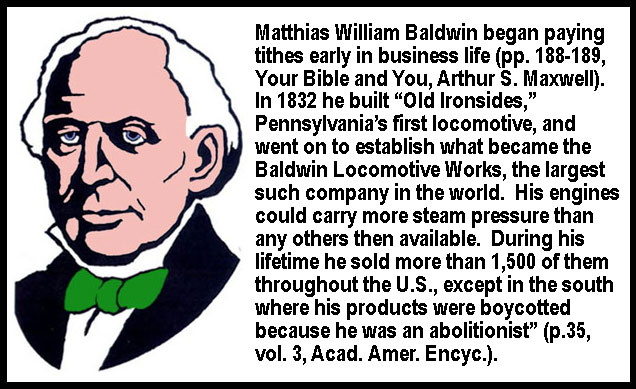

Three Separate Tithes?
One of the hardest concepts for many to accept is the idea of THREE separate tithes -- not just one. How do we know there are THREE different tithes commanded in the Bible? The answer is plain. Scriptures identify THREE different applications or uses for the tithe. There are even THREE different methods or procedures to follow in regard to tithing. Either there are THREE tithes or the Bible contradicts itself.
The FIRST TENTH of one's income goes to the priests of God. These priests take the form of Melchizedek (Gen.14:18-20; Heb.7) or Levites (Num.18:21-24) or Aaron (Num.18:25-32) or Aaron's sons (2 Chr.31:19; Neh.10:38) or ministers of Christ (the fulfillment of Melchizedek) (Heb.7; 1 Cor.9:13-14).
The SECOND TENTH of one's income goes toward any food consumed during the eighteen annual feast days of the year (Atonement is a fast day) since these festivals occur in "the place which the Eternal thy God shall choose to set his name there" (Deut.16:2,6,11,15,16) and that is precisely the same place where the tithes must be spent on food (Deut.12:5,11,14,18,21,26; 14:23-25; cp. Jub.32:10-14). If the feast days existed from the time of Adam, and continue to be required today, then SECOND TITHE automatically must be required to finance the menu. Notice that SECOND TITHE can't be eaten "within thy gates" (Deut.12:17-18), yet THIRD TITHE is to be eaten "within thy gates" (Deut.14:28-29).
The THIRD TENTH of one's income goes to "the Levite (minister), the stranger (unconverted dependent?; foreigner in the church), the fatherless (orphan), and the widow (including divorcees), that they may eat within thy gates, and be filled" (Deut.26:12; 14:28-29; 1 Tim.5:16). In other words, a sort of welfare fund for the poor every THIRD and SIXTH year in a cycle of seven (Deut.14:28; 26:12; Amos 4:4; Deut.15:1,9,18; Ex.23:11). Maimonides understood this cycle but not its application (p.31, Lansdell). These scriptures apply primarily to spiritual Israelites within the gates of the church today -- not to unconverted heathen. Christ said, "ye have the poor always with you" (Matt.26:11) and Deuteronomy states, "the poor shall never cease out of the land" (15:11), so if the problem still exists, how could the solution be abolished? (See inset article on page 9 to determine when to pay this tithe.)
Since THIRD TITHE isn't continuous every year, the question of when to begin and end the THIRD TITHE CYCLE -- which month and day -- is sometimes brought up. One teaching is that THIRD TITHE should commence on the Feast of Tabernacles. Exodus 34:22 and Deuteronomy 31:10 are used as supposed proof for this concept, but these scriptures don't say to begin TITHING on this festival. Rather, this is the time when "thou shalt read this law before all Israel." But in Leviticus 25:9-11 we are told that the Jubilee Year begins on the Day of Atonement. Since the Jubilee Year is synchronized with the seven-year cycles of THIRD TITHE (Deut.15; Lev.25), the Day of Atonement must also be the date when the THIRD and SIXTH-year TITHING begins and ends. (The Talmud teaches Trumpets as the day to begin tithing -- Rosh Hashanah 1:1-2)
The apocryphal book called TOBIT gives further proof that THREE separate tithes are historically accurate:
Often I was quite alone in making the PILGRIMAGE to Jerusalem, fulfilling the law that binds all Israel perpetually. I would hurry to Jerusalem with the FIRST yield of FRUITS and BEASTS, the TITHE of cattle and the sheep's FIRST sheerings. I would give these TO THE PRIESTS, the sons of Aaron, for the altar. TO THE LEVITES ministering at Jerusalem I would give my TITHE of wine and corn, olives, pomegranates and other fruits. Six years in succession I took the SECOND TITHE in money and went and paid it at Jerusalem. I gave the THIRD to ORPHANS and WIDOWS and to the STRANGERS who live among the Israelites; I brought it them as a gift EVERY THREE YEARS. When we ate, we obeyed both the ordinances of the Law of Moses and the exhortations of Deborah, the mother of our father Ananiel (Tobit 1:6-8).
JOSEPHUS also corroborates THREE different tithes. Notice this quote from book 4, chapter 8 and section 8 of Antiquities:
Let there be taken out of your fruits a TENTH, BESIDES that which you have alotted to give to the PRIESTS and LEVITES. This you
may indeed sell in the country, but it is to be used IN THOSE FEASTS and sacrifices that are to be celebrated in the holy city: for it is fit you should enjoy those fruits of the earth which God gives you to possess, so as may be to the honor of the donor.
Now read the following quote from book 4, chapter 8 and section 22 of Antiquities:
Besides those TWO TITHES, which I have already said you are to pay every year, the one FOR THE LEVITES, the other FOR THE FESTIVALS, you are to bring every THIRD YEAR a THIRD TITHE to be distributed to those that WANT; to women also that are WIDOWS, and to children that are ORPHANS. But as to the ripe fruits, let them carry that which is ripe FIRST OF ALL into the temple; and when they have blessed God for that land which bare them, and which he had given them for a possession, when they have also offered those sacrifices which the law has commanded them to bring, let them give the FIRST-FRUITS to the priests. But when anyone hath done this, and hath brought the TITHE OF ALL THAT HE HATH, together with those FIRSTFRUITS that are for the LEVITES, and for the FESTIVALS, and when he is about to go home, let him stand before the holy house, and return thanks to God.
During the Maccabean period, THIRD TITHE provided for widows and orphans on a regular basis: "Then the high priest told him that there was ... money laid up for the relief of WIDOWS and FATHERLESS children" (2 Macc. 3:10).
Last of all, in book 4, chapter 8, section 19 of Antiquities, this is found: "and let him that has gathered it carry it to the holy city, and spend that, together with the TITHE of his other fruits, in FEASTING with his FRIENDS, with the ORPHANS, and the WIDOWS." This is a reference to SECOND TITHE.
Yes, SECOND TITHE can be used for "them for whom nothing is prepared" (Neh.8:10), "your households" (Deut.12:7), "the Levite" (Deut.12:12,18), "thy son, and thy daughter, and thy manservant, and thy maidservant, and the Levite, the stranger, and the fatherless, and the widow who are within thy gates" (Deut.16:14).
But this SECOND TITHE cannot be used for gasoline or transportation to and from the feasts. Deuteronomy 12:17-18 states, "Thou MAYEST NOT eat WITHIN THY GATES the TITHE of thy grain, or of thy wine, or of thy oil, or the firstlings of thy herds or of thy flock ... But thou must eat them before the Eternal thy God IN THE PLACE WHICH THE ETERNAL THY GOD SHALL CHOOSE." Gasoline and transportation expenses to and from the feasts AREN'T in the place which the Eternal thy God shall choose. Also, gasoline isn't edible. Yet the obvious purpose for second tithe is FOOD and DRINK (Deut.14:26). The phrase
"for whatsoever thy soul desireth" is obviously said in the context of various DIFFERENT FOODS.
Some people insist on buying MOTEL ACCOMMODATIONS with this money. But the Bible says, "And ye shall take on the first day the BOUGHS OF GOODLY TREES, BRANCHES OF PALM TREES, and THE BOUGHS OF THICK TREES, and WILLOWS OF THE BROOK ... Ye shall DWELL IN BOOTHS seven days" (not in motels for eight days) (Lev.23:40,42). A motel is a permanent structure. God's word specifies a TEMPORARY SHELTER, like a camping tent or prefabricated hut -- a dwelling that can be erected on the first day and taken down on the seventh. Can a motel meet this criterion? Obviously not! The only legitimate use for SECOND TITHE is FOOD: "for oxen (steak), or for sheep (lambchops), or for wine, or for strong drink (whiskey)" (Deut.14:26).
"Do His will as if it were your own, so that He will do your will as if it were His. Nullify your own will before His so that he will nullify the will of others before you" (Pirke Avot 2:4).
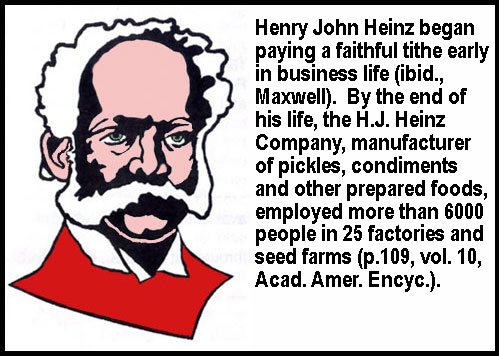

Does Social Security Take The Place of Third Tithe?
Since the U.S. Government takes far more than a TENTH of our income from us and spends it on widows and orphans in America, many people sincerely believe that THIRD TITHE is not mandatory anymore. But is this true? Our Social Security and Welfare systems have CORRUPT, INEFFICIENT bureaucracies. They often help the lazy WELFARE CHEATERS who don't deserve help while the DESERVING poor are NEGLECTED. Unemployment compensation laws PREVENT a recipient of the dole from WORKING on another part-time, low-paying job and thus encourage laziness. Also, our government draws NO DISTINCTION between true SPIRITUAL ISRAELITES (Christians) and HEATHEN Americans. Therefore our money could be helping all the wrong people for all we know. But Christ said, "Inasmuch as ye have done it (provided food, clothing or shelter) unto one of the least of these my BRETHREN (Those who "do the will of my Father" -- Matt.12:50), ye have done it unto me" (Matt.25:40). Remember that in ancient Israel, EVERY citizen obeyed God's laws and therefore national welfare would ALWAYS go to deserving people. THIRD TITHE is our PERSONAL RESPONSIBILITY before God, not the government's responsibility.
Is Recycling Gleaning?
"When ye reap the harvest of your land, thou shalt not WHOLLY reap the CORNERS of thy field, neither shalt thou gather the GLEANINGS of thy harvest. And thou shalt not GLEAN thy vineyard, neither shalt thou gather EVERY grape of thy vineyard; thou shalt LEAVE THEM for the poor and stranger: I am the Eternal your God" (Lev.19:9-10). Total harvesting of crops was forbidden in ancient Israel's agricultural economy (Lev.19:10; Deut.24:19-22). Only the poor were allowed to eat what was left. Christ's disciples were poor and so gleaned (Matt.12:1). Modern urban gleaning by the poor would include shopping at GOODWILL INDUSTRIES and THRIFT STORES, collecting all GARBAGE and TRASH from businesses and private individuals, RECYCLING glass bottles, paper and cardboard, aluminum cans and copper piping, etcetera. This is the rightful domain of the poor. The current socialist monopoly of high-priced garbage collectors who toss everything into accumulating trash dumps is unbiblical.
Did Jesus Christ Tithe?
Before turning to the New Testament, notice that both Hezekiah's revival (2 Chr.31:5-6) and Nehemiah's revival ( Neh.10:34-37) included returning to both TITHING and giving FIRSTFRUITS.
Now let's jump to the New Testament. Did Jesus Christ abolish the law of TITHING and replace it with "generous giving"?
Christ stated, "Think not that I am come TO DESTROY THE LAW, or the prophets; I am not come to destroy, BUT TO FULFILL" (Matt.5:17). Fulfill what? Christ answers, "all things must be fulfilled, which were written in the law of Moses, and in the prophets, and in the psalms CONCERNING ME" (Luke 24:44; see also vv.25-27; Luke 18:31-34 & Acts 13:27-33).
Christ fulfilled the RITUALISTIC TYPES and SACRIFICIAL SHADOWS in the law as well as the PROPHECIES in the prophets. But Christ didn't come to destroy the laws against MURDER, ADULTERY or THEFT (Non-tithing is stealing!). These laws aren't prophetic. Tithing isn't a SHADOW, TYPE or SYMBOL of anything. It doesn't TYPIFY Christ's death or the gift of the Holy Spirit. Unlike sacrifices, the Levite priesthood, washings and the temple, TITHING doesn't FORESHADOW a more permanent REALITY. TITHING is part of the MORAL LAW that reveals God's UNCHANGING CHARACTER (Mal.3:6; Heb.13:8).
It's true that Christ also fulfilled the MORAL LAW, but in a DIFFERENT way. He magnified the law and made it honorable (Isa.42:21) by ADDING the full SPIRIT and INTENT to the mere LETTER of the law. This is proven by reading through the "Sermon on the Mount" from Matthew 5:21 to 44. But how did Christ MAGNIFY or FULFILL the law of TITHING?
The answer is found in Matthew 5:20 where Christ warned his disciples, "except your RIGHTEOUSNESS shall EXCEED the RIGHTEOUSNESS of the scribes and Pharisees, ye shall in no case enter into the kingdom of heaven." What was the RIGHTEOUSNESS of the scribes and Pharisees that we must SURPASS or GO BEYOND?
Matthew 23:23 answers, "Woe unto you, scribes and Pharisees, hypocrites! For ye pay TITHE of MINT and ANISE and CUMMIN, and have omitted the weightier matters of the law (implying tithing is a matter of law too), JUDGMENT, MERCY and FAITH; these ought ye to have done and NOT to leave the other UNDONE" (TITHING). Here Christ fulfilled or magnified the law of TITHING by showing that diligence and zeal toward the "matters of the law" must extend to ALL PARTS of that law, not just ONE PART. This is the righteousness Christ required OF HIS DISCIPLES if they were to enter into the kingdom.
Christ told the Herodians, "Render, therefore, unto Caesar the things which are Caesar's; and UNTO GOD, the THINGS which are GOD'S" (Matt.22:21). Christ was speaking in the context of TAXES -- "tribute money." This is a FINANCIAL context. God's TITHE is a TAX. What else could it be since "the earth is the Lord's, and the fulness thereof" (1 Cor.10:26; Ps.24:1). As the Eternal says, "I owe no one anything. Everything under the heaven is mine" (Job 41:11, Living Bible). "Every beast of the forest is mine, and the cattle upon a thousand hills" (Ps.50:10). "The sea is his, and he made it" (Ps.95:5). "All things come of thee, O Lord; and of thine own have we given thee" (1 Chr.29:14). God is the owner, and we are just STEWARDS PAYING RENT! So Christ must have been including God's TITHE when he said, "Render ... UNTO GOD, the THINGS that are GOD'S."
Now if Jesus Christ commanded the SCRIBES, PHARISEES, HERODIANS, and even his own DISCIPLES via Matthew 5:1,20 and 23:23 to TITHE, wouldn't it be reasonable to think that Christ also TITHED? Jesus Christ was a "JEW" (John 4:9; Heb.7:14). He was considered by many to be a "RABBI" -- a teacher authorized to interpret Jewish law (John 1:38,49; 3:2; 6:25; 20:16). Nowhere in the entire New Testament do we find anybody accusing him of FAILING to TITHE. This is especially significant in light of the fact that CHRIST ATE MEALS together WITH PHARISEES (Luke 7:36-39; 11:37-38; 14:1), because the Pharisees would "NOT BE A GUEST" with people who DISREGARDED the law of TITHING (p.312, Life And Times of Jesus The Messiah). To even be called "RABBI" implied that Christ TITHED since, at that time, ALL "RABBIS" TITHED and "every accredited public 'teacher' was, unless anything was known to the contrary, SUPPOSED to have taken upon him the OBLIGATIONS" (of TITHING) (pp.311-312). "A person might undertake only the second (TITHING), without the first (purity) of these obligations" in which case he was called an 'accredited one' (p.311) in the eyes of the Pharisees.
Nicodemus was a ruling Pharisee and said to Christ, "Rabbi, we (Pharisees) know that thou art a teacher come from God" (John 3:2). Certainly this implies that CHRIST TITHED.
"Jesus Christ the RIGHTEOUS" (1 John 2:1) knew that "all thy commandments (including TITHING) are RIGHTEOUSNESS" (Ps.119:172). Jesus Christ "WHO DID NO SIN" (1 Pet.2:22) knew that "SIN is the TRANSGRESSION of the LAW" and one of those LAWS is TITHING (1 John 3:4).
But most significant of all is the fact that Christians should FOLLOW the EXAMPLE that CHRIST SET. First Peter 2:21 says that Christ left us an example, "that ye should follow his steps." First John 2:6 states, "He that saith he abideth in him (Christ) ought himself also so to walk, even as he walked."
In Matthew 28:19-20, Christ commanded his disciples, "Go ye, therefore, and teach all nations ... Teaching them to observe ALL THINGS whatsoever I have COMMANDED you."
Did Christ ever COMMAND any of his disciples to TITHE? Jesus said to Philip, "FOLLOW ME" (John 1:43) and to Peter and Andrew, "FOLLOW ME, and I will make you fishers of men" (Matt.4:19). If we FOLLOW HIM, we will TITHE too, because he TITHED (see also Matt.9:9). Also, Christ "COMMANDED" his disciples when he "opened his mouth, and taught them (his disciples), saying ... except your righteousness shall EXCEED the righteousness of the scribes and Pharisees, ye shall in no case enter into the kingdom of heaven" (Matt.5:2,20). The scribes and Pharisees TITHED (Matt.23:23).
It is not valid for critics to reply that Christ also commanded a cleansed leper to "offer the gift" Moses mentioned (Matt.8:4; cp. Lev.14:4-32), because Christ didn't command a "DISCIPLE" (Matt.28:16-20) to offer this sacrifice. The cleansed leper was not a DISCIPLE of Christ.
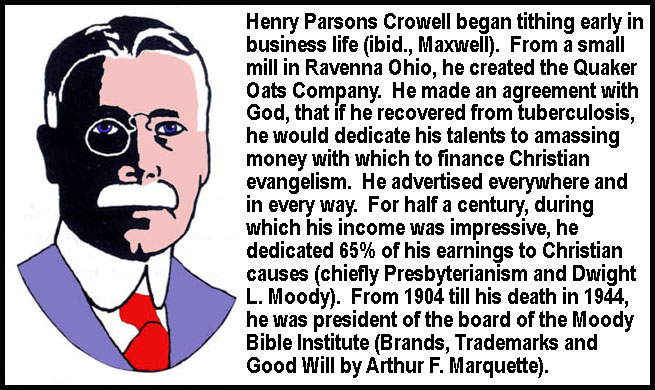
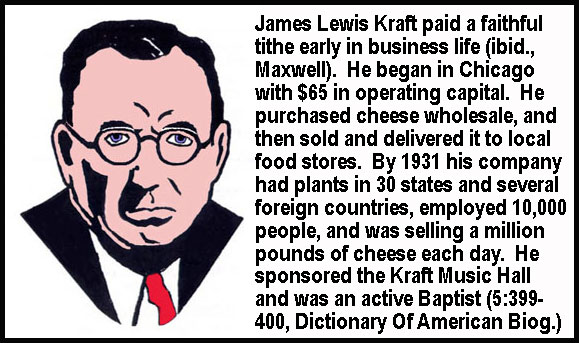
Did Paul Tithe?
What about the "apostle to the Gentiles" (Rom.11:13)? Did Paul teach or practice the law of TITHING?
In Philippians 4:9 Paul said, "Those things which ye have both LEARNED, and RECEIVED, and HEARD, and SEEN in me, DO." In 1 Corinthians 4:16, Paul said "Be ye FOLLOWERS of me." In 1 Corinthians 11:1 Paul stated, "Be ye FOLLOWERS of me, even AS I also am of Christ." These Corinthians were gentiles (1 Cor.12:2).
Around 55 A.D., Paul wrote in 1 Corinthians 9:11-14:
If we have sown spiritual seed among you, is it too much if we reap a material harvest (of TITHES) from you? If others have this RIGHT OF SUPPORT from you, shouldn't we have it all the more? But we did not use this RIGHT. On the contrary, we put up with anything rather than hinder the gospel of Christ. Do ye not know that THEY (Levites -- Num.18:6) WHO MINISTER ABOUT HOLY THINGS (tithes -- Lev.27:28-33) LIVE OF THE THINGS OF THE TEMPLE (tithes -- Num.18:21; Neh.10:38; 1 Chr.9:26)? AND THEY WHO WAIT AT THE ALTAR (priests -- Num.18:7) ARE PARTAKERS WITH THE ALTAR (tithes -- Num.18:28; offerings, etc. -- Lev.7:5-6 & Deut.18:3-4)? EVEN SO (by this same tithing method) HATH THE LORD ORDAINED THAT THEY WHO PREACH THE GOSPEL SHOULD LIVE OF THE GOSPEL" (N.I.V. except verses 13 and 14).
Furthermore, Paul must have TITHED himself. Paul was a PHARISEE (Acts 23:6; 26:5; Phil.3:4-5) and so would have followed Christ's admonition to the Pharisees to not leave TITHING "UNDONE" even in the smallest areas. Of course, as a Pharisee, Paul would have diligently TITHED anyway and he did that very thing long after Christ was crucified since he was able to boast around 60 A.D. in his letter to the Philippians that he was "BLAMELESS" concerning the law (Phil.3:4-6). In the same book of Philippians, Paul commands, "Those things which ye (Gentiles) have both LEARNED, and RECEIVED, and HEARD, and SEEN in me, DO" (4:9). So Paul was, in effect, telling the Philippians to TITHE. In 1 Corinthians 16:1-2 Paul said, "Now concerning the COLLECTION ... let every one of you lay by him IN STORE (cp. "storehouse" -- Mal.3:10), AS GOD HATH PROSPERED HIM." (Not "as he feels led" but instead as a proportionate percentage basis.)
Since both Jesus Christ and Paul celebrated the feast days (Luke 22:8; John 7; Acts 20:6,16; 1 Cor.11), it automatically follows that both used SECOND TITHE to pay for the meals. Also, since both Jesus Christ and Paul believed in giving to the poor (Matt.25:35-40; Luke 12:33; Gal.2:10; Acts 24:17), it automatically follows that THIRD TITHE was one method employed.
What Is The "Carnal Commandment"?
The Old Testament Israelite system of TITHING was transferred from the Levite to the Melchizedek Priesthood. The only New Testament change was to whom the TITHES are paid -- not whether or not they are paid. The discussion in Hebrews the seventh chapter concerns which priesthood is better -- Melchizedek or Levi. Which deserves the tithe? Let's go there now.
From verses 1 to 11 Paul merely compares the LEVITE Priesthood with the MELCHIZEDEK Priesthood and shows that the former is inferior to the latter not only because its priests die (v.8), but also because Levi actually paid tithes to Melchizedek in the sense that Levi was genetic material in Abraham's body when Abraham TITHED (vv.9-10). If the Messiah doesn't receive tithes, he is inferior to Levi.
Incidentally, the book of Hebrews was written around 61 A.D., thirty-one years AFTER THE CRUCIFIXION, yet Paul speaks in the PRESENT tense of TITHING as being still commanded. The Levites "HAVE" a commandment to take tithes of the people according to the law" (7:5).
Now verse 12: "For the priesthood being CHANGED (from Levi to Melchizedek), there is made of necessity a CHANGE also of the law." (of TITHING)
The words for "CHANGED" (metatithemi) and "CHANGE" (metathesis) here both come from the same Greek root. One is the verb form and the other a noun. According to Strong's Concordance (3331 & 3346), the meaning of the noun is "transferral," "transport," "exchange," etcetera. This word can also mean "removal" or "disestablishment," but if Paul had intended either of these meanings, he would surely have used a much stronger, more clear cut, Greek word than "metathesis" to convey it. If TITHING were ABOLISHED, why not say "ABOLISHED" and use the Greek word "KATARGEO"?
Continuing in Hebrews 7: "after the similitude of Melchizedek there ariseth another priest, Who is made, not after the law of a CARNAL COMMANDMENT but after the power of an endless life.... for there is verily a disannulling (cancellation) of the COMMANDMENT going before for the weakness and unprofitableness of it. For the LAW made nothing perfect, but the bringing in of a better hope did ... For the LAW maketh men high priests who have infirmity, but the word of the oath (7:21), which was since the LAW, maketh the Son, who is consecrated for evermore" (7:15,16,18,19,28).
Obviously the "CARNAL COMMANDMENT" or "LAW" is not referring to TITHING. Instead, it is referring to the physical descent of Levite priests -- the law that "maketh men high priests who have infirmity." That "LAW" has been "EXCHANGED" for a better one because "we have a great high priest ... Jesus, the Son of God" (Heb.4:14), and Jesus Christ's body is the church (1 Cor.12:12-27), so if a man TITHES to the true church, he is tithing to Jesus Christ, the great High Priest. We no longer TITHE to physical Levites or priests.
Hebrews 7 proves TITHING is still in FULL FORCE today. But it is extremely important that a person give his TITHES to Christ's body -- the true church -- not some counterfeit. The TITHE is God's (Lev.27:30), but the RESPONSIBILITY of deciding who gets it is the PERSON'S. God holds each Christian accountable as the STEWARD of that money (Luke 19:11-27). This is the ultimate check on religious corruption. If a church becomes evil, and won't repent, then the Christians in that church should STOP supporting it. Otherwise they are "partaker of his EVIL deeds" (2 John 11). If a church or other Bible organization is accurately teaching and doing what the Bible says, then Christians should SUPPORT it with their tithes. As Tobit said, "Scatter your bread on the graves of the UPRIGHT, but do not give to SINNERS" (4:17). Or as Jeshua said, "Give to the GODLY man, and do not help the SINNER; Do kindness to the HUMBLE-MINDED, and do not give to the UNGODLY ... so that he may not come to control you with it" (Ecclesiasticus 12:5). We shouldn't "strengthen ... the hands of evildoers" (Jer.23:14; Ez.13:22). "It is not meet (right) to take the CHILDREN'S bread, and to cast it to the DOGS" (Matt.15:26). "Shouldest thou help the UNGODLY, and love them who hate the Eternal? Therefore, there is wrath upon thee from before the Eternal" (2 Chr.19:2).


Tithing After The Destruction Of The Temple
In chapter 15, volume 2 of the J.B. Bury edition of The Decline And Fall Of The Roman Empire, a section is devoted to "Oblations and revenue of the church," and another section to "Distribution of the revenue." Edward Gibbon writes:
Instead of an absolute sacrifice, a moderate proportion was accepted by the ministers of the gospel; and in their weekly or monthly assemblies, every believer, according to the exigency (urgency) of the occasion, and the measure of his wealth and piety, presented his voluntary offering for the use of the common fund. Nothing, however inconsiderable, was refused; but it was diligently inculcated that, in the article of TYTHES, the MOSAIC LAW was still of divine OBLIGATION; and that, since the Jews, under a less perfect discipline, had been COMMANDED to pay a TENTH PART of all that they POSSESSED, it would become the disciples of Christ to distinguish themselves by a superior degree of liberality, and to acquire some merit by resigning a superfluous treasure, which must so soon be annihilated with the world itself.... A decent portion was reserved for the maintenance of the bishop and his clergy (FIRST TITHE?); a sufficient sum was alotted for the expenses of the public worship, of which the feasts of love, the agapae, as they were called, constituted a very pleasing part (SECOND TITHE?). The whole remainder was the sacred patrimony of the poor. According to the discretion of the bishop, it was distributed to support widows and orphans, the lame, the sick, and the aged of the community; to comfort strangers and pilgrims, and to alleviate the misfortunes of prisoners and captives, more especially when their sufferings had been occasioned by their firm attachment to the cause of religion (THIRD TITHE?) (pp.50,51,53).
A prophecy written for our day -- the twentieth century -- is found in the book of Ezekiel. Ezekiel was a prophet to the House of Israel (2:3; 3:1,4-7) but was unable to deliver his message because he was a captive taken to Babylon with the rest of the House of Judah (1:1-2). Even if he had been able to deliver his message, Israel had already been taken captive over 120 years before. This prophecy was intended for our nation today.
Her priests have violated my LAW (of TITHING), and have profaned mine HOLY THINGS (the TITHES -- Lev.27:30); they have put no difference between the HOLY and the PROFANE, neither have they shown difference between the unclean and the clean, and have hidden their eyes from my sabbaths, and I am profaned among them.... The people of the land have USED OPPRESSION, and EXERCISED ROBBERY, and have VEXED (troubled) the POOR and NEEDY: yea, they have OPPRESSED the STRANGER wrongfully" (Ez.22:26,29; see also Jer.7:6 & Ex.22:22).
By neglecting THIRD TITHE, a person is actually ROBBING and OPPRESSING the POOR and NEEDY.
Another prophecy written for our day is found in the book of Malachi:
"Will a man rob God? Yet ye have robbed me. But ye say, Wherein have we robbed thee? In TITHES and OFFERINGS. Ye are cursed with a curse (or "Ye have cursed me with a curse"); for ye have robbed me, even this whole nation. Bring all the TITHES into the storehouse, that there may be meat in mine house, and PROVE ME now herewith, saith the Eternal of hosts, if I will not OPEN for YOU the windows of heaven, and pour out for you a blessing, that there shall not be room enough to receive it" (Mal.3:8-10; see also 2:1-10).
God allows himself to be placed on trial by you. PUT GOD to the TEST. See if the "windows of heaven" open up for you. Genesis 7:11 defines this phrase as abundant rainfall which to a farmer means lots of money. If you become richer by tithing, it is proof that God exists. As Christ said, "If any man will do his will, he shall know of the doctrine, whether it be of God, or whether I speak of myself" (John 7:17). On the other hand, many elderly Christians are poverty-stricken because they robbed God in their early years. TITHING is a LIVING LAW! As Ronald Reagan once said, "The Lord -- really, we could copy Him a little bit. The Lord had a pretty simple tax plan -- tithing -- that His share is a tenth." To this he added: "When we start computing Caesar's share it gets a little bit out of line." God doesn't penalize the industrious tither. But humans do penalize those who honestly prosper. No matter how much money a family made, they would still owe only 10 percent. President Reagan's comment on this aspect of God's system was "The Lord said, 'If I prosper you ten times as much, you will give ten times as much.' He didn't say you'll give 70 times as much." He said this in late 1981 or early 1982.
Who Was Melchizedek?
The name "Melchizedek" means "King of Righteousness." Since he was "King of Salem" (Heb.7:1-2) and "Salem" means "Peace," he was "King of Peace" also. Salem is identified with Zion or Jerusalem in Psalm 76:2. If these phrases are meant to be Divine titles rather than merely statements such as "Mayor of Philadelphia (Mayor of Brotherly Love)," then they are blasphemous if applied to any human or angel. Only God deserves them. Isaiah said "all our righteousnesses are as filthy rags" (Isa.64:6). Christ said, "There is none good but one, that is, God" (Matt.19:17). Jesus Christ is called the "Prince of Peace" (Isa.9:6). But they are probably not meant to be Divine titles since a human king of Jerusalem, who was conquered by Joshua, was called "Adonizedek" (Josh.10:3), meaning "Lord of Righteousness." We know he wasn't God.
Melchizedek was "Without father, without mother, without descent, having neither beginning of days nor end of life" (Heb.7:3). This verse could also be taken either of two ways. Either it is talking about God since only God is eternal (John 1:1) and angels were all created (Ez.28:13), or the kingship/Priesthood of this man was not geneologically inherited (was not a right of birth) and the Bible doesn't record Melchizedek's geneology. "Several of the Tell el-Amarna tablets are letters written to the Pharaoh by Ebed-tob ... the king of Uru-Salim. He tells the Pharaoh ... he received his crown (not) from his father or mother; it had been conferred on him by 'the Mighty King'" (p.25, Biblical Studies in the Light of Archaeology by Jackson). We know he wasn't God.
Since Melchizedek is called "priest of the Most High God" (Heb.7:1), he couldn't be God the Father. Besides, "No man hath seen God at any time" (John 1:18) nor heard his voice (John 5:37). Yet Abraham saw Melchizedek and heard his voice.
Melchizedek was "made like unto the Son of God" (Heb.7:3). This could also be taken either of two ways. Either he was the "Word," not yet born of the virgin Mary, so "like" the Son of God, or he was a human being like Isaac, Moses, David or Jonah -- all types of Christ.
If a mere human, then Melchizedek, king of Salem, was Shem, king of Jerusalem according to Jasher 16:11. Shem was a type of Christ. Abraham was taught for 39 years by Noah and Shem (Jasher 9:6). Melchizedek is actually called a "man" in Hebrews 7:4.


When is the Cycle Of Sabbatical Years? When is the Jubilee?
It is necessary to find out which years are Sabbatical Years (or seventh years) (Lev.25:1-8) in this modern 20th century since that data is needed in determining which years are the THIRD and SIXTH in this unbroken, seven-year THIRD TITHE cycle (Deut.14:28).
The JUBILEE YEAR, or "fiftieth year" (Lev.25:10) doesn't disturb this seven-year cycle since, after seven sevens, or 49 years, the JUBILEE is considered year number one of the next 49-year cycle as well as year number 50 of the previous cycle. (See Josephus, "Dissertation V," section 39, p.700. Daniel's 70-Weeks' Prophecy also confirms the 49-year cycle, since no 50th years are ever counted there.)
So if we can accurately pinpoint and date a particular JUBILEE in history, it's a simple matter of adding multiples of seven to that date to arrive at modern dates for SABBATICAL YEARS and thus the THIRD and SIXTH years between any two SABBATICALS can be known.
Christ's Torah-reading in Luke 4:18-19 occurred on the first year of the 70th week in the fall since it was to be 69 weeks "unto the Messiah" (Dan.9:25) when his public teaching began (457-456 B.C. + (69 x 7 = 483 years) = 27-28 A.D.) at the age of 30 (Luke 3:23). He was born in 4 B.C. just before an eclipse which can also be dated at 4 B.C. (Ant.17:6:4). He was "cut off" "in the midst of the week" of seven years (Dan.9:26-27) which brings us to the spring of 31 A.D. on Passover (John 13:1). But Christ was announcing a JUBILEE which is always the first year of the 49-year cycle.
Christ was quoting from Isaiah 61:1-2 when he said, "The Spirit of the Lord is upon me, because he hath anointed me to preach the gospel to the POOR (economically) ... to preach DELIVERANCE to the CAPTIVES (economically indebted bondservants) ... to set at LIBERTY ("Jubilee" means "Liberty" -- Ant.3:12:3; cp. Lev.25:50; Ez.46:167 says "year of liberty") them that are bruised (by cancelling their debts and returning their land to them -- Lev.25:10,39-40; 27:24), To preach the ACCEPTABLE YEAR OF THE LORD (the Jubilee Year)."
In 26-27 AD, Luke 4:16-24 says that Jesus "came to Nazareth, where he had been brought up: and, as his custom was, he went into the synagogue on the sabbath day, and stood up for to read. And there was delivered unto him the book of the prophet Esaias. And when he had opened the book, he found the place where it was written, The Spirit of the Lord is upon me, because he hath anointed me to preach the gospel to the poor; he hath sent me to heal the brokenhearted, to PREACH DELIVERANCE TO THE CAPTIVES, and recovering of sight to the blind, to SET AT LIBERTY them that are bruised, TO PREACH THE ACCEPTABLE YEAR OF THE LORD. And he closed the book, and he gave it again to the minister, and sat down. And the eyes of all them that were in the synagogue were fastened on him. And he began to say unto them, THIS DAY IS THIS SCRIPTURE FULFILLED IN YOUR EARS." Therefore this "sabbath" must have been Tishri 10, Yom Kippur starting the Jubilee Year (27-28 A.D.).
In Lev. 25:10, the LORD (YHWH) said, "PROCLAIM LIBERTY" (i.e., the Jubilee). Isaiah 61:1,2 says, "PROCLAIM LIBERTY" (the Jubilee). When Jesus read Isaiah 61:1,2, he said, "The Spirit of the Lord GOD is upon me; because the LORD hath anointed me ... to PROCLAIM LIBERTY (i.e., the Jubilee Year) to the captives."
It looks like 27-28 AD was the Jubilee Year. 26-27 AD was a Sabbatic Year
"Jews believe the Son of David will come on the last Jubilee" (http://www.biblestudy.org/bibleref/holy-days/jubilee-and-the-sabbath-year.html). HE DID. Jesus was present in Israel during the Sabbatic Year of 27 AD (the first Passover of his ministry) and the Jubilee Year of 28 AD (the second Passover of his ministry). I think he announced the coming Jubilee Year on the Day of Atonement after the Sabbatic Year.
Deuteronomy 15:1-2 says, "At the end of every seven years thou shalt make a release. And this is the manner of the release: Every creditor that lendeth ought unto his neighbour shall release it; he shall not exact it of his neighbour, or of his brother; because it is called THE LORD'S RELEASE." John 8:36 says, "If the Son therefore shall make you free, ye shall be free indeed."
According to William Whiston's footnotes to Josephus, "AD 27 was a Sabbatical Year and A.D. 28 was a Jubilee" (Dissertation 5:55). He bases his conclusion on chronological information, not on Luke 4:16-24. Thus we have two independent witnesses saying the same thing.
When Is A Modern Jubilee?
Adding 1960 years (7 x 7 x 40) to 27-28 A.D. gives us 1987-1988 for a modern Jubilee or year one of another cycle. This cycle is then 1993-1994 for the first Sabbatical Year (7th year); 2000-2001 for the second Sabbatical Year (7th year); 2007-2008 for the third Sabbatical Year (7th year); 2014-2015 for the fourth Sabbatical Year (7th year); 2021-2022 for the fifth Sabbatical Year (7th year); 2028-2029 for the sixth Sabbatical Year (7th year); 2035-2036 for the seventh Sabbatical Year (7th year). Then another Jubilee in 2036-2037. Each of these 7-year cycles has a third tithe year and a sixth tithe year which begins and ends on Yom Kippur (Day of Atonement) (Lev. 25:9). "Then shalt thou cause the trumpet of the jubilee to sound on the tenth day of the seventh month, in the Day of Atonement" (Lev. 25:9).
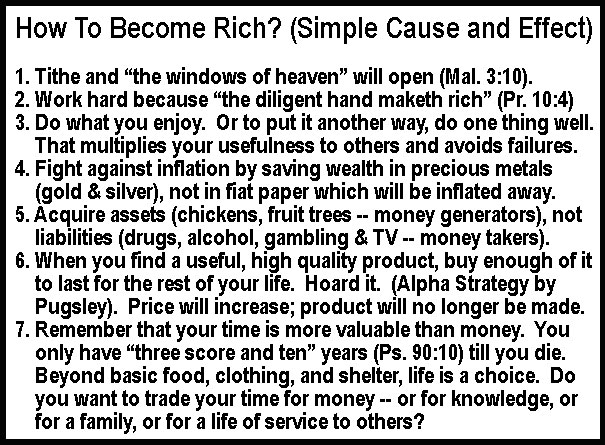
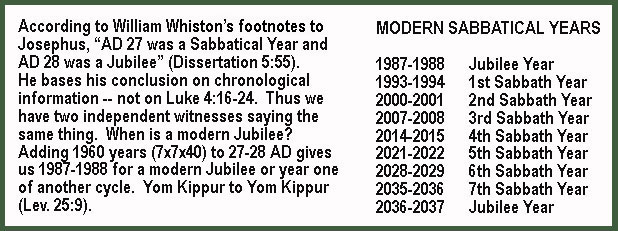
Does Tithing PAY?
People wonder
"Does tithing really pay off?" "What do I get out of it?" "Honor the Lord with thy substance, and with the firstfruits of all thine increase; So shall thy barns be filled with plenty, and thy presses shall burst out with new wine" (Pr. 3:9-10). "Keep the commandments of the Lord, and his statutes, which I command thee this day, FOR THY GOOD" (Deut. 10:13). "Bring ye all the tithes into the storehouse, that there may be meat in mine house, and prove me now herewith, saith the Lord of hosts, if I will not open you the windows of heaven, and pour you out a BLESSING, that there shall not be room enough to receive it" (Mal. 3:10). The following letters, from around the world, testify to the benefits of tithing:
The first month I paid tithes, the amount was $13; the second month, $23. This is the third
month and I owe God $38. Thank you for starting a sinner to pay his tithes. My income has
almost tripled.
Reader from Metz, West Virginia
Here is just a line to inform you that after little or no blessing had come from the tithe I was
paying, I learned that we are to pay one tenth of our gross, not net, earnings. So I decided
to do this. Two days later I was offered a transfer at work and although the man I replaced
was earning the same as I was, I received a 10 percent raise! All this, plus the fact that I am
happier at my new work. Indeed, God never breaks His promises.
Reader from Bristol, England
About two weeks ago ... my husband got an unexpected raise without even being told he
was getting it. It just showed up on his paycheck. God really does bless the tither and keeps
His promises, doesn't He?
Couple from Sterling, Kansas
We want to thank you and your organization for teaching us the truth about God and His plans....
Since we started tithing almost a year ago, my wages have come close to being doubled, and
we have come through a lot of tough times without much trouble at all.
Man from Lafayette, Georgia
A soldier abroad writes this:
I thought I would stop tithing, but I've found that I just can't get away with it. My conscience
bothers me and besides, all sorts of troubles, mostly financial, will start. Right after payday this
month, someone stole all my money. At the time I was worrying about how I would be able to
make two overdue payments on my record player. I didn't have to worry long -- the shop came
and repossessed it. The next day my radio blew a tube and a few days later I broke my watch.
Then people started stealing other things of mine. All this has been going on for a month
without letup. I'm almost $100 behind in tithes right now, yet when I did get a check for $20 or
$30 I would just spend it foolishly. Right now I feel like the thief, justIy rewarded, for stealing
from God. I have $3 to my name right now, and I am going to {pay God} $1. I am getting back
on the right path again, lest something else happens to me. I finally realized I can't afford not to
tithe.
Serviceman in Germany
But suppose you are so in debt you think you can't afford to tithe. What then? Listen to this experience:
Before I started tithing, I had only a part·time job which netted me $30 a week take-home pay.
Then I read your articles on tithing and also the letters from your readers. So I decided to trust
the Lord and began giving the Lord's tithe to you and His Work. ... Now, just 10 months later,
I am completely out of debt. (I was well over $1000 in debt) I have 2 jobs which net me $100
a week, I have money in the bank, and furnished my own 5-room apartment in cash, Is this
proof enough that the Lord watches those that do His will?
Young Woman from Minnesota
Tithing is the best cure for being in debt. It teaches you how to spend your money wisely. It makes God your partner in business when you need Him most.
Another reader says:
I began tithing about six weeks ago and now I have just been informed that my salary was to
be increased by over $200 per year. I have learned that it pays to tithe.
Reader from Atlanta, Georgia
Or suppose you are newly married and have sudden new expenses? We had one of the teen-age marriages you always hear about.
My husband was 19 and I was 17 and pregnant. We fought constantly. We were deep in debt
and just kept getting deeper. When you would talk about tithing we would laugh. We had
enough to pay without adding something. Then one day ... we decided to try tithing. Well, we
are proof it works! We have been tithing about a year now and are almost completely out of debt.
My husband has a better job and we live in a much nicer house.
Wife from Covington, Louisiana
My marriage sure doesn't seem to be getting any better. We haven't tithed for quite some time
and tried to tell ourselves we just couldn't afford it, but who's kidding who?? We can't afford not
to.
Wife from Bethany, Oklahoma
Can't afford to tithe? There's your answer! Learning the Hard Way.
Due to our neglect of God's laws we have had a great loss come upon us. On the morning of
January 20, we got up to the sight of our barn in flames. Everything we owned in the line of cattle
was lost. We had 6 head of cattle which included 2 milking cows, 1 heifer soon to calf, 3 small
calves, 68 hens and a rooster. We lost much more, including all the carpenter tools. tractor, and
farm equipment. W e know this loss was a spiritual lesson because we had neglected to tithe
regularly and neglected to send in offerings on gifts given to us. God was merciful, however, in
letting us have our home for if the wind had blown in the opposite direction, our home would have
been lost. We know God wanted to teach us a lesson that was much needed. It took a great blow
to wake us up.
Woman, New York
I am a sad example of one who decided to quit tithing just for a little while until I could catch up
on some of my bills. Well, that little while turned out to be several months and I still haven't caught
up. My financial condition has become increasingly worse. The last few weeks have been a
nightmare. Financial difficulties have come against me like waves of the sea and all my frantic
efforts to make ends meet have been in vain. I am forced to make double payments on my home
each month to prevent foreclosure and to add to this frustration, my last double payment became
lost in the mail. This quickly brought another threat of foreclosure. To top it all off, I am being
harshly criticized for deciding to tithe again. Well, I'm mailing my tithe anyway despite criticism
and the threatening foreclosure. I sincerely hope that others will not have to learn through bitter
experiences that it always pays to obey God no matter what the circumstances.
Man, Texas
We were told that tithing was a good way to prove God. This was proved to us without a doubt.
One week things were a little tight, and we didn't send in any tithe. Our car broke down and I had
to miss a day's work plus the repair costs. I have started sending my tithes again and things are
changing for the better. I was called back to work at my former job with a raise. I just wanted you
to know how we have been affected by God.
Man from St. Charles, Missouri
Even during drought, God stands ready to intervene for those who obey Him! Here is one example:
I would like to report a blessing from tithing. Never before this year have I ever realized a crop
worth over $52 an acre. This year we netted almost $70 per acre on some of our crops. Yet, in many
places, the prophesied drought has been taking its toll.
Reader from Canada
I would like to testify that God does bless the tither. Nine months after we began tithing to God with
our substance I had almost doubled my income. Now, it seems that I can hardly spend what God gives
me. We have all that we need and more. There is much joy that comes from knowing God keeps His
promises.
Family, Fort Worth, Texas
Up to a few months ago, I was not tithing faithfully. I gave when I thought I could, but began to
realize that was wrong. I could not lie to
myself any longer, so decided then and there to do
what was right. I started giving freely, actually wanting to give, not wanting or expecting any
thing in return. I didn't deserve it. I was without a job, no income, very little savings -- it was a
poor predicament to be in. Within 2 weeks the opportunity for employment with a well-known
and expanding gas company was opened. I now have a job with no layoffs all year round,
come rain, snow, and high water. Advancement possibilities are excellent. What more can a
person ask, but the thing is -- I didn't have to ask; it was given. All I had to do was give.
Man from Sheridan, Oregon
I must let someone know that I know God's financial laws are real. Since I have been tithing, I
have gotten a better job, more money here at the prison and got 2 raises in 5 months, plus the
opportunity to learn a trade, so I won't ever have to steal again in life.
Prisoner in Connecticut
Here are my fiance's tithes for these past two weeks. When he first began tithing he said he
did it partly to please me. After he paid the second group of tithes he got a raise. Now he
knows God means what He says.
Woman from Rose, Oklahoma
The final question is do you know God means what He says? Prove Him!
He challenges you to do it!
Can We Eat Second Tithe On New Moons And Sabbaths as Well as Annual Feast Days?
Since SECOND TITHE must be eaten "before the Eternal thy God in the place which the Eternal thy God shall choose" (Deut.12:17-18), we know that SECOND TITHE can be eaten during the eighteen ANNUAL FEAST DAYS because they occur "in the place which the Eternal thy God shall choose to set his name" (Deut.16:2-16). But if this is the only avenue for SECOND TITHE, we will always be left with a surplus of remaining food since it is impossible to eat one tenth of a year's income in eighteen days.
But God doesn't ask the impossible. There must be another avenue we can take. For instance, why can't SECOND TITHE be eaten during MONTHLY NEW MOONS and WEEKLY SABBATH festivals? These special occasions are also called "feast days" (Lev.23:2-3; Ps.81:3) and were the scene of great banquets (1 Sam.20:5,18; Col.2:16). How were these feasts or banquets financed if not by SECOND TITHE?
These special occasions occur "before the Lord" (1 Chr.23:31; Ez.46:3; cp.2 Ki.4:22-23) just like the ANNUAL FEAST DAYS (Ex.23:17; 34:23), and the phrase "before the Lord" seems to automatically encompass being in the place which God chooses (Deut.16:16; Matt.18:20).
We find Israelites meeting together at Jerusalem -- the place God chose -- not only on the ANNUAL FEAST DAYS, but also on NEW MOONS and WEEKLY SABBATHS (Ez.46:3). Of course, "all males" were required to appear on the ANNUAL FEAST DAYS (Ex.23:17; 34:23; Deut.16:16). Also SABBATHS , and possibly NEW MOONS, were commanded assemblies in the Old Testament (2 Kings 4:22-23; Lev.23:2-3), in the New Testament (Col.2:16) and will be in the Millenium (Ez.46:3).
Also, originally there were "places" plural where God recorded or put his name (Ex.20:24). First he chose Gilgal (Josh.5:10), then Mizpah (Judges 11:11; 20:1), then Shiloh (Judges 21:19; Joshua 18:1; Jer.7:12). But when the tabernacle was built and replaced simple altars, we find only one location at Jerusalem (2 Sam.6:17). Today we aren't under any such limitations (Matt.18:20). Paul celebrated WEEKLY SABBATHS and ANNUAL FESTIVALS at Philippi (Acts 20:6,16), at Ephesus (1 Cor.16:8) and anywhere else he could find a local synagogue (Acts18:21; 16:12-13; 17:1-2; 27:9) so God must place his name wherever and whenever "two or three are gathered together" in his name (Matt.18:20). As Christ said, "the hour cometh, when ye shall neither in this mountain, nor yet at Jerusalem, worship the Father" (John 4:21; cp. Rev.11:8). But God "shall choose Jerusalem again" (Zech.2:12; 14:16).
Typical Budget Of An Israelite*
1. First Tithe (Lev.27:30) |
10% |
2. Second Tithe (Deut.14:22-27) |
10% |
3. Third Tithe (Deut.14:28-29) (Every third and sixth year in seven) |
10% |
4. Holy Day Offerings (Deut.16:16) |
varies |
5. Regular Offerings (Mal.3:8) |
varies |
6. Firstfruits (Deut.26:1-11) (One fiftieth of the produce -- Mishna 1:11) (Given to minister at Pentecost) |
2% |
7. Firstborn Beasts and Men (Num.18:15-16) |
5 shekels each** |
8. Corners Of The Field (Lev.19:9) (One sixtieth of the field -- Mishna1:2) |
1.7% |
9. Gleanings, Forgotten Or Overlooked Grapes, Sheaves & Olives (Lev. 19:10; Deut. 24:19-22; Christ's disciples were poor & gleaned) |
varies |
10. Fourth Year Fruit From Trees (Lev.19:23-25; A person avoids having scrawny fruit trees by not growing fruit the first three years.). |
varies |
11. Money Set Aside For Loans To The Poor (Deut.15:7-10) |
varies |
12. Ransom For One's Soul (Ex.30:11-16) (Christians don't pay since we claim the same prerogative the priesthood claims -- Shekalim 1:3; Matt.17:26) .....1/2 shekel each** |
1/2 shekel each** |
*Note: Some Israelites were farmers; others were ranchers or fishermen. Therefore, not every item applies to every Israelite. |
How Do You Circumcise A Tree?
Leviticus 19:23-25 says, "And when ye shall come into the land, and shall have planted all manner of trees for food, then ye shall count the fruit thereof as uncircumcised; three years shall it be as uncircumcised unto you; it shall not be eaten. But in the fourth year all the fruit thereof shall be holy with which to praise the Eternal. And in the fifth year shall ye eat of the fruit thereof, that it may yield unto you the increase thereof: I am the Eternal your God."
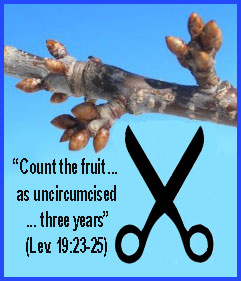
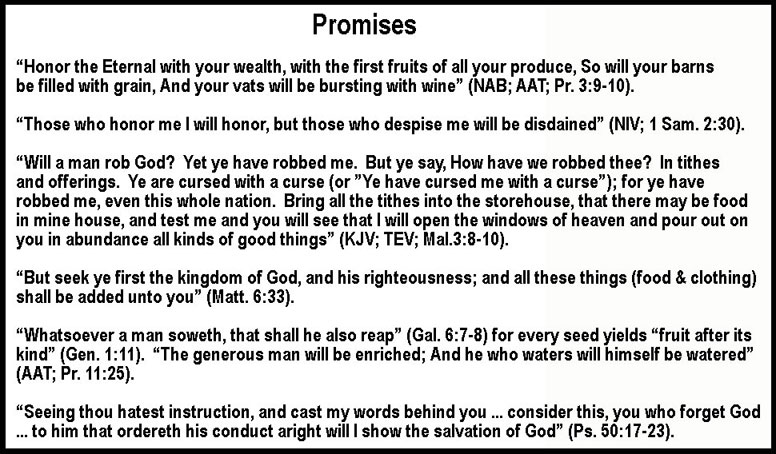
What does it mean "uncircumcised"? Just as a baby boy is circumcised the eighth day by cutting off his foreskin, so also the BUDS on the ends of the fruit branches, that normally blossom into the fruit, should be CUT OFF the branches after they form for three years.
"The literal meaning (of verse 23) is 'ye shall close its closing'; it shall be barred so that no benefit is derived therefrom" (p.727, The Soncino Chumash). Or "You shall block it (from use)" (Rashi; Rashbam) ... or "You shall purge its defilement" (Septuagint)." (p.602, The Living Torah). Or "you shall expose its foreskin" (p.105, The Interlinear Bible by Jay P. Green). "Ye shall circumcise the foreskin of the same with their fruits" (Coverdale). "You shall take away their firstfruits" (Catholic).
But why? Why are we not permitted to let any fruit form on a tree for the first three years after it is planted? "Pruning of young fruit trees (under 6 years) is done to develop strong, low framework branches and not much else. In fact, it may take a while longer for your tree to fruit" (p.417, Carla Emery, Encyclopedia Of Country Living). "It hurts a young tree to let the fruit ripen upon it; and therefore to circumcise it, or PINCH OFF THE BLOSSOMS of the first three years, will improve the quality of its fruit" (2:308 Pulpit Commentary). The strength of growing plants must not be diverted into the production of fruit. The strength must be channeled into the production of a big strong trunk with thick strong branches. Then when the fifth year rolls around, the gardener will be rewarded with an abundant crop of fruit -- more abundant than if he had picked the fruit of all five years -- and with a far greater potential for future yields. Pinching off blossoms "takes much more time than pruning since you have to pinch regularly during the first few weeks of new growth" (C. Emery, ibid., p.416).
Conclusion
All Christians are "children of Abraham" (Gal.3:7,29;
Rom.4:11). Since Abraham gave "TITHES of all" (Gen.14:20)
and since Christ said, "If ye were Abraham's children, ye would do the WORKS of
Abraham" (John 8:39), why don't Christians TITHE too? "Whatever
things were written aforetime (in the Old Testament) were written for our LEARNING" (Rom.15:4). "Now these things (we read about
in the Old Testament) were our EXAMPLES" and "they are
written for our ADMONITION, upon whom the ends of the world are come"
(1 Cor. 10:6,11). In addition to Abraham, we find another EXAMPLE
for our LEARNING. Jacob said to God, "of all that thou shalt
give me I will surely give the TENTH unto thee" (Gen.28:20).
And Moses "who received the lively oracles (including TITHING)
to give unto us" (who are Christians) (Acts 7:37-38), would not have
given them to us if they were abolished. As Christ said, "Do not think
that I will accuse you to the Father: there is one that accuses you (of
sin), even Moses, in whom ye trust. For had ye believed Moses, ye would
have believed me: for he wrote of me. But if ye believe not his writings,
how shall ye believe my words? (John 5:45-47). Moses commanded TITHING!
But how do we know there are THREE different tithes commanded in
the Bible? For one reason, scriptures identify THREE different applications
or uses for "ALL the TITHE" (Lev.27:30; Deut.14:22-23;
26:12). There are even THREE different procedures to follow in regard
to tithing. Also, Antiquities 4:8:8,19,22 and Tobit 1:6-8 confirm THREE
TITHES. The FIRST TENTH of one's income goes to the
priests of God: Melchizedek (Gen.14:18-20) or Levites (Num.18:21-24) or
Aaron's sons (2 Chr.31:19; Neh.10:38) or ministers of Christ (the fulfillment
of Melchizedek) (Heb.7; 1 Cor.9:13-14). The FIRST TENTH of
our income is God's BEFORE we benefit from the rest. Elijah must
have been a Levite because he said to the widow, "make me of it a little
cake FIRST" (1 Ki.17:13). Give away to God FIRST whatever
you want yourself. Whatever you plant today as seed, you will reap tomorrow
(Gal.6:7). You reap LATER than you plant. You reap the SAME
TYPE OF THING that you plant and you reap MUCH
MORE than you plant (Mal.3:10). The SECOND TENTH of
one's income goes toward any food eaten at the annual feast days every year
since these festivals occur in "the place which the Eternal thy God
shall choose to set his name there" (Deut.16:2,6,11,15,16) and that
is precisely the same place where the tithes must be spent on food (Deut.12:5,11,14,18,21,26;
14:23-25; cp. Jub.32:10-14). If the feast days existed from Adam's time,
and continue to be required today, then SECOND TITHE automatically
must be required to finance the menu. Notice that SECOND TITHE can't be eaten "within thy gates" (Deut.12:17-18), yet THIRD
TITHE is to be eaten "within thy gates" (Deut.14:28-29).
The THIRD TENTH of one's income goes to "the Levite (minister),
the stranger (newcomer in the church), the fatherless (orphan), and the
widow (including divorcees), that they may eat within thy gates, and be
filled" (Deut.26:12; 14:28-29; 1 Tim.5:16). A welfare fund for the
poor every THIRD and SIXTH year in a cycle of seven (Deut.14:28;
26:12; Amos 4:4; Deut.15:1,9,18; Ex.23:11). These scriptures apply primarily
to spiritual Israelites within the gates of the church today - not to unconverted
heathen. Christ said, "ye have the poor always with you" (Matt.26:11),
so if the problem still exists, how could the solution be abolished? Since THIRD TITHE isn't continuous every year, when should we begin
and end the THIRD TITHE CYCLE? Since the Jubilee Year
begins on the Day of Atonement (Lev.25:9-11) and is synchronized with the
seven-year cycles of THIRD TITHE (Deut.15; Lev.25), the Day
of Atonement must also be the date when the THIRD and SIXTH-year
TITHING begins and ends; or as the Talmud says the Feast of Trumpets
is the date -- Rosh Hash. 1:1-2. We don't believe in tithing gross income.
Operating costs (Expendable purchases used in our occupations) are not increase.
We believe in FIRSTFRUITS (1/50th of income) (Deut.26), REDEEMING
FIRSTBORN MAN and BEAST (Num.18:15-16), CORNERS
of the FIELD (1/60th of income) (Lev.19:9), GLEANINGS, FORGOTTEN
or OVERLOOKED GRAPES, SHEAVES and OLIVES (Lev.19:10;
Deut.24:19-22), FOURTH-YEAR FRUIT from TREES (Lev.19:23-25) since we "CIRCUMCISE" fruit buds for three
years after planting, and RANSON for one's life (Ex.30:11-16) which
Christians don't have to pay (Matt.17:26).
Next Lesson:
Were the FEAST DAYS Abolished? | Back
to Home | Email Us